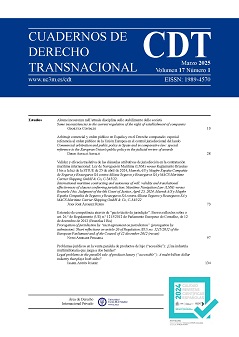Hydrogen in the European Union’s framework
progress and obstacles
Abstract
Hydrogen has been increasingly present in EU environmental and energy policy since the beginning of the 21st century. Its wide-ranging properties make it an ideal material for the decarbonisation of certain sectors and progress towards a more sustainable and climate-neutral Union. However, the lack of technological innovation in the early days, coupled with the existence of other more economically and industrially profitable energy sources, seriously delayed the development of a hydrogen technology industry in the EU. However, recent events such as the Covid-19 crisis or the Russian invasion of Ukraine have highlighted the need for a Union that is energetically self-sufficient through the diversification of its energy sources, thus moving towards a more environmentally committed Union. In recent years there have been significant developments within the Union, and the aim of this paper is to analyse these policies, as well as the advantages, obstacles and inconsistencies they represent.




